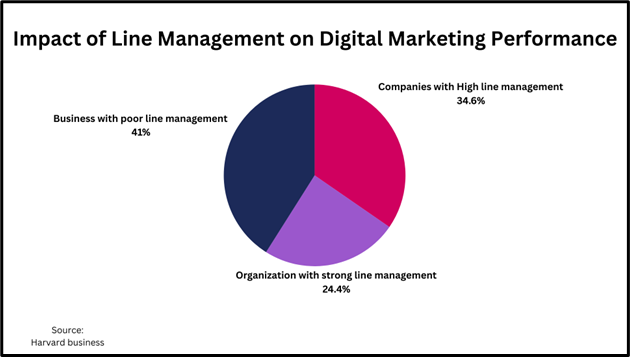The Role of Line Managers in Digital Marketing Success
Digital marketing has undergone a seismic transformation over the past decade. Gone are the days of static, one-size-fits-all campaigns. Instead, the modern era demands agile, data-driven strategies that can adapt to ever-changing consumer behavior and technological advancements.
The rise of digital channels has revolutionized the way companies market their products and services. The shift has created a need for a more nimble and collaborative approach in organizations. This approach breaks down silos between departments and fosters cross-functional synergies.
Line managers play a pivotal role in this transition, serving as unsung heroes who propel digital marketing teams toward success.
Line Managers as Catalysts for Digital Transformation
In an evolving digital world, line managers serve as catalysts for digital transformation within their marketing teams. They have a unique position and bridge the gap between vision and execution. Effective line management training is crucial to equip these leaders with the skills required to navigate digital transformation. Attending a workshop for new line managers in London can provide a solid foundation for their roles. Effective line management is key to digital transformation as it converts executive directives into actionable plans
Line managers comprehensively understand the strengths, weaknesses, and dynamics of their teams. This insight empowers them to orchestrate necessary adjustments in processes, technology, and skill sets, ensuring their teams maintain a position of excellence in digital marketing.
Enhancing Team Performance Through Effective Leadership

Driving digital transformation is the beginning of a line manager’s impact. Their true prowess lies in their ability to enhance team performance through effective leadership, motivating and guiding their teams to reach new heights.
Setting clear goals and expectations is paramount, as it aligns the team’s efforts towards a unified vision. However, line managers must do more than give directives. They must create a supportive environment that promotes continuous learning and growth.
Regular feedback loops, recognizing achievements, and upskilling opportunities are in the line manager’s arsenal. They engage and empower their teams. Managers can unlock their teams’ full potential by encouraging open talk and teamwork. This results in better performance and adaptability.
Key Strategies for Enhancing Team Performance:
- Set clear, measurable digital marketing goals
- Provide regular feedback and coaching
- Recognize and reward team achievements
- Encourage continuous learning and skill development
- Foster a collaborative and supportive team culture
Facilitating Cross-Functional Collaboration
In the world of digital marketing, success is rarely achieved in isolation. It requires a harmonious interplay between various departments, each contributing their unique expertise and perspectives. Line managers are crucial. They facilitate cross-functional collaboration, break down silos, and ensure seamless integration.
Overcoming communication barriers and fostering a shared understanding of organizational goals is paramount. Line managers must be ambassadors. They must build bridges between their digital marketing teams and departments like IT, sales, and customer service.
By using data-driven marketing, managers can find many insights. This drives more efficient, targeted, and impactful digital marketing campaigns. Line manager skills in data literacy and analysis should be a priority in management training courses UK organizations offer.
However, data literacy is not a prerequisite for line managers; it must permeate throughout their teams. By fostering a data-driven culture and the necessary training, line managers can empower their teams. This will help them interpret and use data well. It will enable them to make informed decisions at every level.
Comparing data-driven and traditional marketing shows the big advantages of the former:
| Metric | Traditional Marketing | Data-Driven Marketing |
| Campaign Targeting | Broad, one-size-fits-all | Personalized, based on customer data |
| Performance Measurement | Limited, often based on estimates | Comprehensive, using real-time analytics |
| Optimization | Reactive, based on post-campaign analysis | Proactive, with continuous optimization |
| Agility | Low, due to rigid campaign cycles | High, enabled by data-driven insights |
| ROI | Difficult to measure accurately | Measurable, with clear attribution models |
Line managers can unlock a wealth of insights by embracing data-driven marketing. It helps them drive more efficient, targeted, and impactful digital marketing campaigns.
Nurturing Talent and Innovation
Innovation is the key to staying relevant in digital marketing. Line managers who encourage creativity and experimentation within their teams will lead the charge.
Identifying and cultivating digital marketing talent within the team is a continuous process. Line managers must be adept at recognizing potential, providing growth opportunities, and fostering an environment that encourages professional development.
Moreover, innovation is the cornerstone of staying ahead in the ever-evolving digital landscape. Line managers can foster a culture of creativity and experimentation by encouraging pilot projects, hosting innovation workshops, and celebrating out-of-the-box thinking.
By nurturing talent and innovation, line managers strengthen their teams. They also help the organization stay competitive and adapt to new trends and technologies. Training for line managers covers talent development, coaching, and fostering innovation. It can help them excel in this crucial part of their role.
The Impact of Line Management on Customer Experience
Today’s world is hyper-connected and customers demand seamless, contextual experiences. The role of line managers in digital marketing is crucial. They ensure that every touchpoint, from initial awareness to post-purchase support, is crafted to meet and exceed customer expectations.
Line managers prioritize customer focus and give personalized, omnichannel experiences. This drives customer satisfaction and loyalty. They also help the organization succeed and last. Comprehensive line management training programs cover all digital marketing. They cover strategy to execution. They can empower line managers to deliver great customer experiences.
FAQs
1. How do line managers balance being hands-on with digital marketing campaigns and delegating responsibilities?
Line managers must master a delicate art. They must balance hands-on work and delegation well. Some oversight and guidance are needed. This is especially true for high-stakes campaigns. But, line managers must also give their teams autonomy and trust.
One effective approach is to establish clear guidelines, milestones, and performance metrics. Delegate tasks and duties based on team members’ strengths and goals. Regular check-ins and feedback loops help keep campaigns on track, fostering team ownership and accountability.
2. Can the absence of effective line management negatively impact digital marketing outcomes?
Without strong line management, digital marketing success can suffer. Teams may operate in silos without clear leadership, guidance, and strategy. This leads to misaligned objectives, fragmented efforts, and bad resource allocation.
Poor line management can also lead to low team morale. It causes a lack of motivation and high turnover rates. These problems hinder productivity and performance. Also, the inability to use data, foster teamwork, or encourage innovation can lead to stagnant strategies. This can also fail to adapt to changing markets.
3. What are the essential skills a line manager must possess to succeed in digital marketing?
Good line managers in digital marketing need a diverse set of skills. They utilize these skills to navigate the demands of this ever-changing field. Here are some essential skills:
- Digital Literacy
- Leadership and People Management
- Strategic Thinking
- Data Analytics and Interpretation
- Cross-Functional Collaboration
- Innovation and Creativity
By refining these skills, line managers can effectively navigate the complexities of digital marketing. They can lead their teams to sustained success.
Conclusion
Given the ever-changing nature of digital marketing, line managers play a crucial role in ensuring success. They play multiple roles, such as driving digital change and enhancing team performance. They also involve fostering collaboration. This is done by using data insights and nurturing talent. The goal is to create great customer experiences.
Line managers can navigate digital marketing adeptly by leveraging agility, data, and cross-functional teamwork. Their leadership and strategic input serve as the linchpin. They ensure digital marketing aligns with organizational goals and stays ahead of the curve.
As the digital landscape continues to evolve, the demand for skilled and visionary line managers will only intensify. These organizations will thrive in the competitive digital arena by providing exceptional customer service. This will drive lasting business growth.




